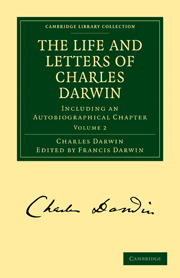Book contents
- Frontmatter
- Contents
- ERRATA
- CHAPTER I THE FOUNDATIONS OF THE ‘ORIGIN OF SPECIES’—1837–1844
- CHAPTER II THE GROWTH OF THE ‘ORIGIN OF SPECIES’—1843–1856
- CHAPTER III THE UNFINISHED BOOK—MAY 1856–JUNE 1858
- CHAPTER IV THE WRITING OF THE ‘ORIGIN OF SPECIES’—JUNE 18, 1858–Nov. 1859
- CHAPTER V PROFESSOR HUXLEY ON THE RECEPTION OF THE ‘ORIGIN OF SPECIES’
- CHAPTER VI THE PUBLICATION OF THE ‘ORIGIN OF SPECIES’—OCT. 3, 1859–DEC. 31, 1859
- CHAPTER VII THE ‘ORIGIN OF SPECIES’ (continued)—1860
- CHAPTER VIII THE SPREAD OF EVOLUTION—1861–1862
CHAPTER V - PROFESSOR HUXLEY ON THE RECEPTION OF THE ‘ORIGIN OF SPECIES’
Published online by Cambridge University Press: 29 August 2010
- Frontmatter
- Contents
- ERRATA
- CHAPTER I THE FOUNDATIONS OF THE ‘ORIGIN OF SPECIES’—1837–1844
- CHAPTER II THE GROWTH OF THE ‘ORIGIN OF SPECIES’—1843–1856
- CHAPTER III THE UNFINISHED BOOK—MAY 1856–JUNE 1858
- CHAPTER IV THE WRITING OF THE ‘ORIGIN OF SPECIES’—JUNE 18, 1858–Nov. 1859
- CHAPTER V PROFESSOR HUXLEY ON THE RECEPTION OF THE ‘ORIGIN OF SPECIES’
- CHAPTER VI THE PUBLICATION OF THE ‘ORIGIN OF SPECIES’—OCT. 3, 1859–DEC. 31, 1859
- CHAPTER VII THE ‘ORIGIN OF SPECIES’ (continued)—1860
- CHAPTER VIII THE SPREAD OF EVOLUTION—1861–1862
Summary
To the present generation, that is to say, the people a few years on the hither and thither side of thirty, the name of Charles Darwin stands alongside of those of Isaac Newton and Michael Faraday; and, like them, calls up the grand ideal of a searcher after truth and interpreter of Nature. They think of him who bore it as a rare combination of genius, industry, and unswerving veracity, who earned his place among the most famous men of the age by sheer native power, in the teeth of a gale of popular prejudice, and uncheered by a sign of favour or appreciation from the official fountains of honour; as one who, in spite of an acute sensitiveness to praise and blame, and notwithstanding provocations which might have excused any outbreak, kept himself clear of all envy, hatred, and malice, nor dealt otherwise than fairly and justly with the unfairness and injustice which was showered upon him; while, to the end of his days, he was ready to listen with patience and respect to the most insignificant of reasonable objectors.
And with respect to that theory of the origin of the forms of life peopling our globe, with which Darwin's name is bound up as closely as that of Newton with the theory of gravitation, nothing seems to be further from the mind of the present generation than any attempt to smother it with ridicule or to crush it by vehemence of denunciation.
- Type
- Chapter
- Information
- The Life and Letters of Charles DarwinIncluding an Autobiographical Chapter, pp. 179 - 204Publisher: Cambridge University PressPrint publication year: 2009First published in: 1887



